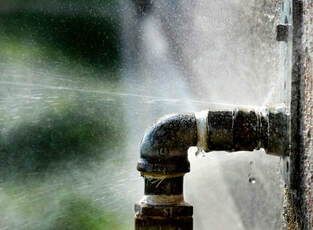How to Examine If Your Home Has a Surprise Leak
How to Examine If Your Home Has a Surprise Leak
Blog Article
We've noticed this article relating to Finding hidden leaks down the page on the web and decided it made perfect sense to discuss it with you over here.

Early discovery of leaking water lines can reduce a potential catastrophe. Some small water leakages might not be visible.
1. Examine the Water Meter
Every home has a water meter. Examining it is a proven manner in which aids you find leaks. For starters, turn off all the water resources. Make certain nobody will certainly purge, utilize the tap, shower, run the washing machine or dishwashing machine. From there, go to the meter as well as watch if it will alter. Given that nobody is utilizing it, there should be no movements. If it relocates, that indicates a fast-moving leakage. If you discover no changes, wait an hour or two and inspect back once again. This implies you might have a slow-moving leakage that can even be underground.
2. Inspect Water Intake
Evaluate your water costs as well as track your water usage. As the one paying it, you ought to see if there are any kind of disparities. If you identify sudden changes, in spite of your usage coinciding, it suggests that you have leakages in your plumbing system. Keep in mind, your water expense should fall under the same range each month. A sudden spike in your bill suggests a fast-moving leak.
On the other hand, a consistent rise each month, despite having the very same routines, shows you have a slow leak that's additionally slowly intensifying. Call a plumber to extensively inspect your residential or commercial property, specifically if you really feel a warm area on your flooring with piping beneath.
3. Do a Food Coloring Test
When it comes to water consumption, 30% comes from toilets. If the color somehow infiltrates your bowl during that time without flushing, there's a leakage between the container and also dish.
4. Asses Outside Lines
Don't fail to remember to check your exterior water lines also. Test spigots by connecting a yard hose. Needs to water permeate out of the connection, you have a loosened rubber gasket. Change this as well as ensure all connections are limited. If you've got a sprinkler system, it will assist get it professionally analyzed and maintained annually. One little leakage can throw away lots of water as well as spike your water expense.
5. Examine and also Analyze the Circumstance
Property owners should make it a behavior to check under the sink counters and even inside cupboards for any type of bad odor or mold development. These 2 warnings show a leakage so timely attention is called for. Doing regular examinations, also bi-annually, can conserve you from a significant issue.
Examine for stainings and also weakening as most devices as well as pipelines have a life expectancy. If you think leaking water lines in your plumbing system, do not wait for it to rise.
Early detection of dripping water lines can minimize a prospective catastrophe. Some tiny water leakages might not be noticeable. Examining it is a guaranteed means that aids you find leakages. One tiny leakage can lose tons of water as well as increase your water costs.
If you suspect leaking water lines in your plumbing system, do not wait for it to rise.
Tips for Detecting Hidden Plumbing Leaks
Check for Signs of Water Damage
We recommend that you check the following places for evidence of water damage:
Near where you store your water heater
Around your sump pump
In areas where pipes are visible
Underneath cabinetry or a vanity beneath a sink
Where your outside hose bib isIf water damage is present, you may also notice mold and/or mildew or smell a foul or musky odor. You might also be able to hear the sound of water running where it shouldn’t be.
Perform a Water Meter Test
One of the easiest ways to determine whether you have a hidden leak on your property is to test your water meter. Turn off all appliances in that use water and make sure you don’t have any faucets running. Locate your water meter and record the reading on it. Continue to leave everything off for a minimum of two hours and then go back and see the meter reading. If it’s a noticeable difference, chances are you have a hidden plumbing leak.
Monitor Your Outside Usage
As the seasons change, you might use more water to keep your yard lush and green and your flowers blooming. However, it’s important to routinely ensure that your sprinkler or irrigation system is working properly and that any outside faucets are completely off. This way you’re not wasting any water.
Do the Toilet Food Coloring Test
Are you kept up at night because your toilet continues to run? If you’ve noticed your toilet randomly refills, especially when it’s not in use, it could mean you have a defective flapper tank and water will leak into the bowl. Fortunately, there’s an easy (and kind of fun!) way to test whether you’re dealing with this issue. Grab some food coloring and add a few drops into your toilet’s tank. Wait 15 minutes and then check to see whether the water in the bowl is colored. If it is, you have a leak within your toilet and the internal assembly will need to be repaired or replaced.
https://www.carterservices.com/blog/2020/february/tips-for-detecting-hidden-plumbing-leaks/

Do you like reading up on Finding hidden leaks? Place feedback down the page. We'd be delighted to listen to your thinking about this post. In hopes that you come back again soon. Sharing is nice. Helping others is fun. Thanks a lot for your time spent reading it.
Report this page